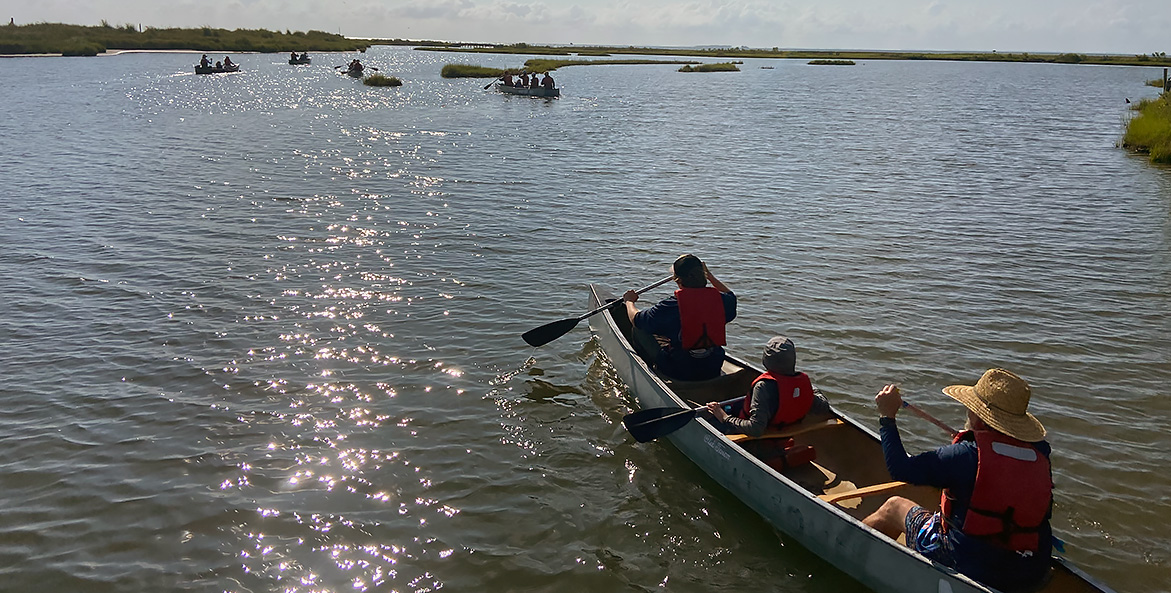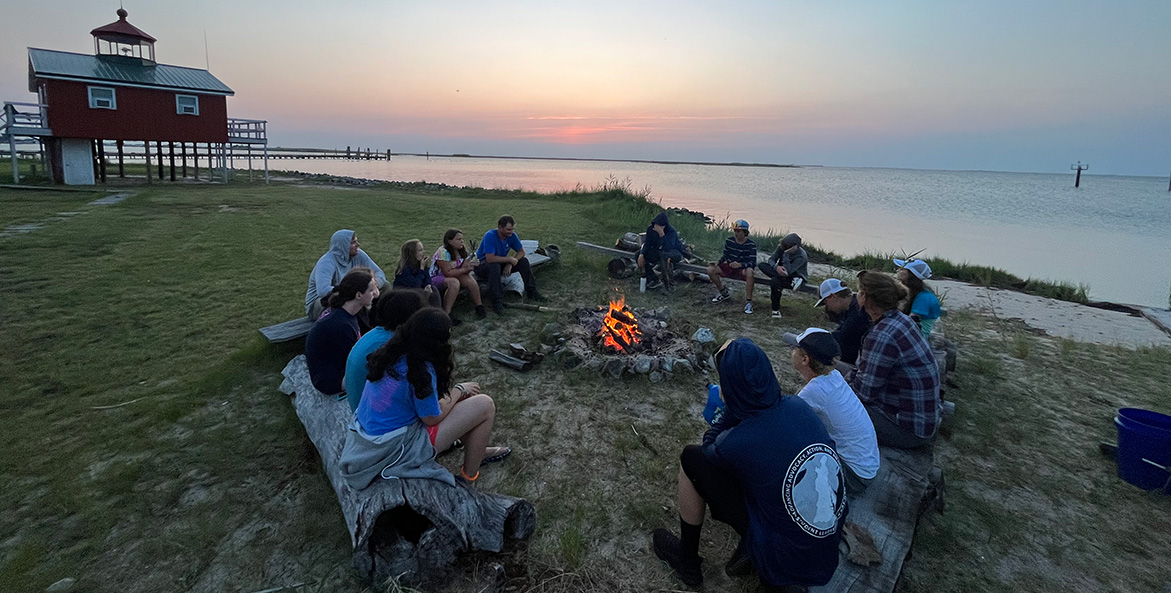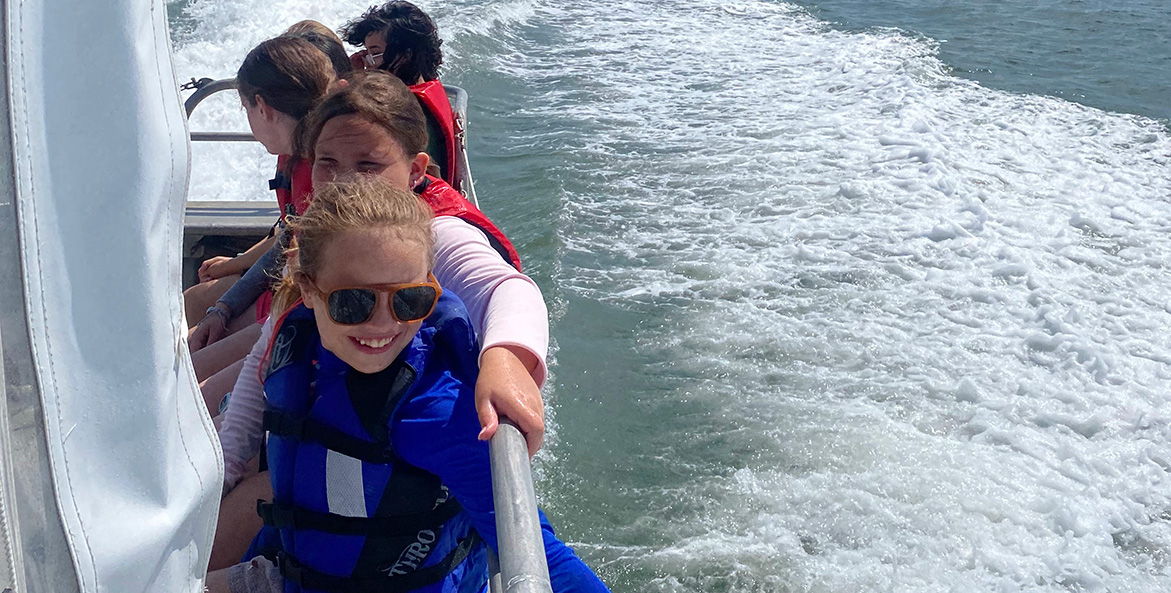When you think of a summer on the Chesapeake Bay, what comes to mind? Perhaps long, hot, humid days marked by early sunrises, the rumble of an afternoon thunderstorm breaking the heat of the day, or fireflies flickering in the dark woods. For those lucky enough to grow up on the Bay, or near the rivers that feed it, many have very formative memories of spending more time outside than in, soaking up as much daylight as possible during those warmer months. Summer camps often are among the fondest of childhood memories. Making new friends, roasting marshmallows around a firepit, taking cool dips in the water to escape the heat, and chatting into the night on bunkbeds shape classic summer camp experiences.
Last summer, the Chesapeake Bay Foundation ran its first-ever Bay ecology camp in mid-July for middle school-aged students. This camp brought many of the aspects of a classic summer camp to a remote island in the middle of the Chesapeake Bay—our Port Isobel Island Environmental Education Center. Port Isobel rests at the southern end of a string of legendary islands in the middle of the Bay. Its closest neighbor is Tangier Island and on its northern horizon lies Smith Island. An hour-long boat ride from Crisfield, Maryland brought campers out to their home away from home for a week full of adventure.
The week began with the group jumping right into their first exploration—underwater grass beds. Just off the shoreline of a small cove was an entire world waiting to be explored. Mostly made up of widgeon grass, these underwater grass beds are full of exciting species including lined seahorses, northern pufferfish, diamondback terrapins, and a variety of other crabs, fish, and shrimp. Campers were equipped with nets meant to roll across the bottom and buckets to safely house their catch. Wading waist-deep in the water proved to be a welcomed break from the hot sun and our fish tank quickly filled up from the campers’ efforts.

Canoeing among the marshes surrounding Port Isobel Island is one of many memorable and bonding experiences for students during Bay Eco-Camp.
Jeff Varnon
The rest of the week would follow suit with the same energy and excitement for the experiences that followed. We set crab pots from the boat under the careful guidance of our captain, hoping to catch enough crabs for a feast later in the week. Fishing off the dock surrounded by a sunset sky proved to be a favorite pastime. One morning the campers learned new paddle strokes and put their knowledge to the test with a peaceful canoe trip to a windswept beach rarely touched by people. Finding diamondback terrapins of all color patterns throughout the week added even more of a thrill to days already full of new experiences.
Sixth grader Cecilia Poussard who attended the inaugural camp last summer especially enjoyed the turtles. “There was a bank trap where diamondback turtles and fish swam in. We put the fish in the aquarium, and then we had fun catching food for the fish. The boys gave names to the turtles and the last day we let them all go and said ‘goodbye turtles have a nice life!’” Cecilia, an avid birder, also took great pleasure in discovering all the birds of the islands—the oyster catchers, herons, ibises, and pelicans. She also enjoyed “getting muddy.”
Midweek, we packed a picnic and set off for an island known for its pirate lore and colony of nesting birds. Watts Island, now a small sliver of land, used to be a thriving farming community and, perhaps, once the hideout of Blackbeard the pirate. With the boat securely at anchor, campers spread out across the shoreline searching for treasures from the past. A glass medicine bottle, the spine of a stingray, shards of pottery, and a few pieces of weathered driftwood would make up our haul.
The days were long and filled to the brim with adventure where new finds or catches were around each corner. The smell of dinner being prepared welcomed campers back inside after the activities of the day. Friends gathered around each table sharing their favorite parts from the previous hours. Some evenings were more laid back with a movie night as a thunderstorm rolled through, or a watercolor art project with music to listen to. Other evenings consisted of a bonfire and stories from the past, or a night hike and stargazing with Scorpio lighting up the southern sky.

A relaxing sunset bonfire at the Port Isobel Island Environmental Education Center provides a great opportunity for students to share the day's experiences.
Morgan Jones
“I enjoyed every second,” says eighth grader Callen Moore. “The days were spent canoeing, fishing, and learning about the Chesapeake Bay. It was my favorite part of summer.”
As the week came to a close, campers packed up their belongings and said goodbye to an island they were now feeling very connected to. Locals on Tangier Island have a saying that goes, “you’ve got the mud between your toes.” It means that you have come out to the islands and fallen in love with the lifestyle and rhythms of island life. Our campers did just that.
This coming summer, we are pleased to offer two different opportunities for students to join our week-long Middle School Bay Eco-Camps on Port Isobel Island. Our first camp session will be taking place July 15-19 and the second camp will be August 12-August 16. Learn more and register your rising 6th, 7th, or 8th grader.




